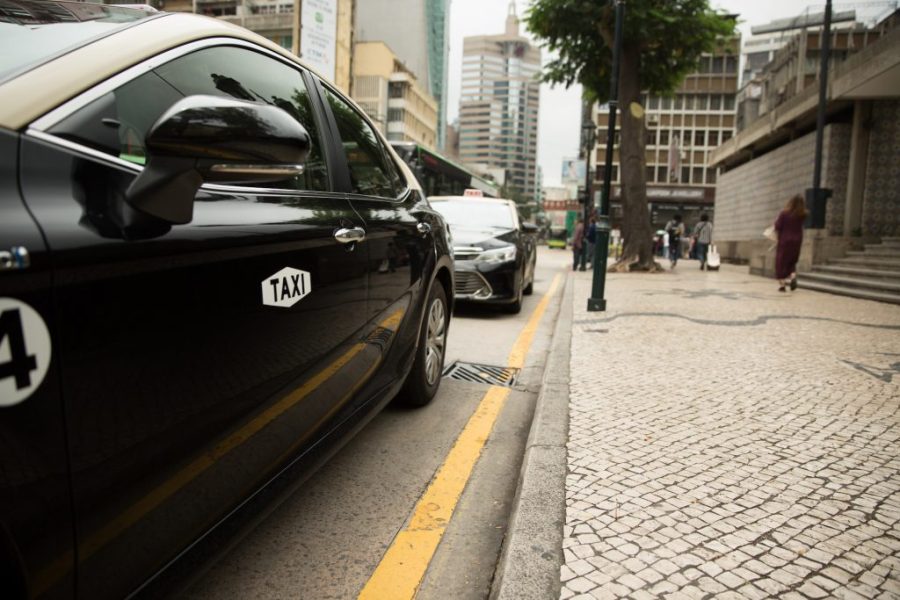The Legislative Assembly (AL) Thursday passed a government-initiated bill regulating the city’s taxi sector, according to which cabbies caught refusing to pick up passengers or overcharging four times within five years will have their taxi-driving licences cancelled.
The bill will become law 90 days after its promulgation in the Official Gazette (BO).
According to the new taxi law, only companies will be allowed to bid for a licence to operate common taxis, as opposed to the current situation in which common taxi-vehicle licences are granted to both individuals and companies. Common taxis – as opposed to special radio taxis – are colloquially known as “black taxis” (“hak dik” in Cantonese).
According to the new taxi law, the fines for various taxi violations will significantly increase, such as for refusing to pick up passengers and overcharging.
The bill’s outline was passed during a plenary session of the legislature in April last year. The legislature’s 3rd Standing Committee held 27 meetings to review the bill, which aims to improve the service quality provided by taxi drivers and tackle the long-standing irregularities in the city’s taxi sector caused by rogue cabbies.
Local and tourists alike are complaining that a fairly large number of taxi drivers are not only violating the most basic rules of civility and decent behaviour but are also severely damaging Macau’s image as a world centre of tourism and leisure.
Secretary for Transport and Public Works Raimundo do Rosario, Transport Bureau (DSAT) Director Kelvin Lam Hin San and Ma Chio Hong, a senior officer of the Traffic Department of the Public Security Police (PSP), attended yesterday’s plenary session when the bill was voted on article-by-article in its final reading.
The government launched a public consultation in 2014 on the drafting of a new law regulating the city’s taxi sector, with the aim of replacing the existing taxi regulation which came into force in late 1999, i.e. shortly before the establishment of the Macau Special Administrative Region (MSAR).
Taxi vehicle licence owners and taxi drivers face a fine of between 300 and 25,000 patacas for violating different rules listed in the existing taxi regulation.
According to the new taxi law, those overcharging passengers – when the overcharged amount is less than 50 patacas – will be fined 6,000 patacas, while cabbies will face a fine of 15,000 patacas when the overcharged amount exceeds 50 patacas.
According to the new taxi law, the fine for providing unlicensed passenger transport services – i.e. passenger transport services provided by unlicensed taxis – increases to 90,000 patacas, from the current fine of 25,000 patacas.
According to the new taxi law, those without a taxi-driving licence who drive a taxi will be fined 30,000 patacas, as opposed to the current fine of 5,000 patacas.
According to the new taxi law, a cabbie will have his or her taxi-driving licence cancelled for committing either one of several violations listed in the law four times within five years, such as refusing to pick up passengers, overcharging them, and choosing to use a route obviously longer than normal unless specified by passengers, i.e. deliberately not taking the most direct and practicable route available. A cabbie whose taxi-driving licence has been cancelled due to the situation will only be allowed to take an examination three years after his or her licence was cancelled to regain it, according to the new law.
According to the new taxi law, the Global Positioning System (GPS), an audio recorder and a video recorder will have to be installed in every taxi. The government has said that the audio and video recorders aim to facilitate investigations by the authorities if arguments occur between a cabbie and his or her passengers(s).
According to the website of the Transport Bureau, there were 1,498 common taxis in the third quarter of last year, as well as 100 special radio taxis run by the Macau Radio Taxi Corporation.
According to the new taxi law, a single company will be allowed to have up to 300 taxi-vehicle licences. The first draft of the bill did not stipulate the maximum number of common taxi-vehicle licences that a particular company would be allowed to hold.
According to the new taxi law, a company must have a minimum capital of five million patacas to bid for a licence to operate common taxis.
The government has insisted that its decision of only allowing companies to bid for taxi operating licences would enable it to better regulate the city’s taxi sector.
During the plenary session, several lawmakers rejected the rule of only allowing companies to bid for taxi operating licences.
But both Rosario and Lam strongly defended the system in which only companies will be allowed to bid for a licence to operate common taxis.






